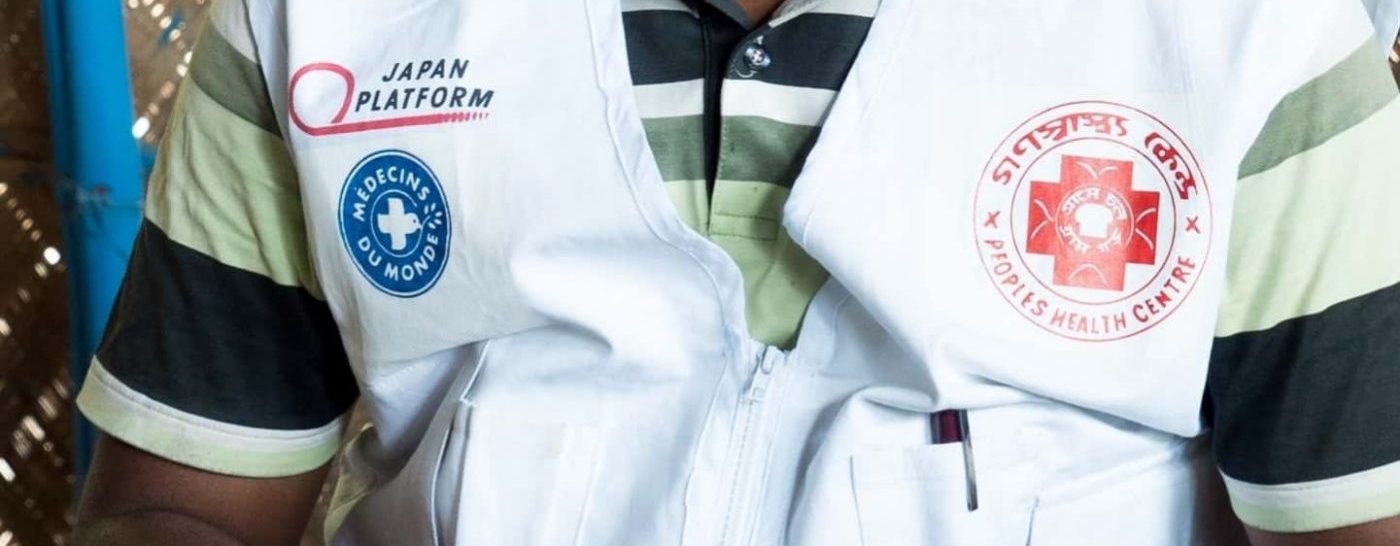Husson, 30 – Testimony of Rohingya
Published 30th December 2018
On his way to Bangladesh, Husson saw a crying boy whose parents had just been killed. He looked after the boy with his family all the way to Bangladesh. The boy is said to have become an important member of the family now. It is hard to believe that Husson has faced such unimaginable violence and persecution. But occasionally, angry feelings mix up with his tranquil appearance and gentle talk.
(Akiko, Doctors of the World Nurse)
I have been working as a volunteer for Doctors of the World since January this year. Now, what we need in the camp here is a school, as education for children is particularly necessary. There are places to play and study where support from NGOs is available but one needs a solid education. We do not have any experienced teachers here. Most refugees have been here for over a year, considering that education for children is one of the most important duties we have to provide, I really want to manage this task.
And then we need clinics. Families are roughly of 5 to 8 people sometimes 12. There are so many tents, and camps are densely populated. The number of clinics is overwhelmingly small compared to the population density. The necessary medical care is far from being sufficient.
I arrived in Bangladesh on August 30, 2017. The raid started at about 3am on the 25th of August 2017 with shooting, arson and rape. I even saw a child being thrown into fire. Violence continued until around 7 in the morning. The house where I used to live also went up in flames, my sister was raped and terrible atrocities went on and on. Around 6am the fire’s momentum increased as the places to escape diminished, we decided to leave Myanmar. Not to get caught, we followed the road along the mountains and ran away hiding from the military and from the Burmese of the Rakhine state. We did not have anything to eat and spent two days in the mountain. After walking endlessly, somehow, we arrived at the Bangladesh border, where we were blocked from entering the country by a guard. Because we were so hungry, the soldier felt sorry for us and he gave us snacks. That night, we were allowed to enter Bangladesh.
On the way to Bangladesh, we saw a 10 year old boy walking. He was crying. “My parents died”. He cried when I called out, he was alone. The boy travelled with our family all the way to the camp, and after we arrived, I tried to find out where his parents were. Both his parents had been killed in Myanmar. I wonder who killed them, until now, I still do not understand.

I have three children, 8, 6, and 3 years old. Today, the boy became a precious member of my family, he is my eldest son, yes, and we live together as a family.
The camps are filled with children in similar circumstances. Like our family members, there are many Rohingya people who adopt children who lost their parents and their families.
Even before August 9, 2017, there was persecution against Rohingya. However if one could afford paying expensive medical fees, one would be treated at the hospital. But since August 9th 2017, it has become even harder to receive treatment. If I go to a hospital now, Rakhine people will be seen as priority and I will be kept waiting for hours until there is no more time for me to be seen by a doctor. August 9th 2017 is the day when new persecution began. From then on, there is no way other than going to Bangladesh when medical treatment is absolutely necessary.
Even when my wife was pregnant in 2015 -at that time we could come and go through the border by paying a certain sum of money- there was a problem and we both people headed to Bangladesh. Shortly after the full moon, while holding her big belly, my wife and I walked to Bangladesh, crossed a river that was a border, and there she bore our third child.
Many people were sacrificed. Rape, arson, shoots, those who are here are those who could survive the atrocities. Although we are safe here, we have no vision of our future.
